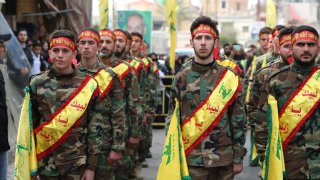Can Iran Replace Hezbollah?
Iran’s attack on Israel last week provides a glimpse into how it might shift its strategy.
Iran’s supreme leader, Ali Khamenei, in his first Friday sermon since the assassination of Qasem Suleimani, stated that the “Axis of Resistance” has defeated Israel and “pushed the Zionist regime back 70 years.” He further urged Muslims from Afghanistan to Yemen and from Iran to Gaza and Yemen to be ready to take action against Israel.
Although he claimed victory, Iran faces a strategic dilemma as a result of Hezbollah’s spectacular loss of power in Lebanon. Hezbollah has been Tehran’s powerful operative in the Arab world for decades, acting as a conduit between Iran and the Shia people in the Arab world and other armed groups in the region. For a non-Arab state like Iran, Hezbollah’s language and ethnicity have been instrumental in establishing and connecting the “Axis of Resistance.” In the last week, Hezbollah’s prestige and hard power have dramatically collapsed as a result of Hassan Nasrallah’s assassination, further assassinations throughout its military command chain, an apparent breakdown of communications, and widespread IDF strikes on its bases and assets. With such a reversal in fortune, where does Iran go from here?
The Israeli invasion of Lebanon has driven over a million people, mostly from Hezbollah-controlled areas, to seek refuge in other parts of the country. In addition, around 76,000 Lebanese fled to Syria along with 200,000 Syrian refugees to Syrian opposition-controlled areas. The political and economic catastrophe that Lebanon was undergoing before the outbreak of hostilities is largely the result of Hezbollah’s parasitic influence in Lebanese politics and society. The lack of assistance from the Lebanese government has further fueled frustration among Hezbollah’s grassroots members while heightening hostilities between Shia refugees and the country’s non-Shia population. That will only lead to sustained instability and a decline in Hezbollah’s popularity. Hezbollah’s reconstruction will require a significant investment of time and resources, which Iran may not be able to afford, especially given its own economic crises.
Tehran, however, has other instruments in its regional toolbox and may soon turn to replace Hezbollah’s once-dominant role. The Shia paramilitary Hashd al-Shaabi (Popular Mobilization Forces) of Iraq might be a viable candidate. However, the group’s fragmented character makes it less potent. The Houthis in Yemen may be Iran’s most promising option.
Iran’s attack on Israel with 181 missiles last week provides a glimpse into how Iran might shift its strategy. First, the attack demonstrated a willingness to risk engaging more directly in military confrontations. Khamenei even admitted that Iran will strike Israel again if necessary. With Israel determined to retaliate strongly, a cycle of a tit-for-tat exchange, potentially escalating into broader conflict or even full-scale war, seems alarmingly imminent. In this scenario, Iran’s style of long-range missile warfare could serve as a model for the Houthis, who, unlike Hezbollah, are not positioned on Israel’s border. The Houthis have already shown their capabilities in Red Sea operations, and by adopting a missile-based strategy, they could extend their reach and increase their value as a proxy for Tehran in the broader conflict against Israel.
Unlike the fragmented Hashd al-Shaabi, the Houthis are a more cohesive group with a unified leadership structure, modeled closely on Hezbollah and established with support from the Islamic Revolutionary Guard Corps (IRGC). The Houthis effectively run large portions of Yeman and have demonstrated their military prowess by targeting U.S. and European interests in the Red Sea, threatening Iran’s regional rivals, like Saudi Arabia, and even attacking Israeli ports with long-range missiles.
Another critical factor is Russia. Moscow views the Houthis as a strategic asset as it escalates its provocations to the West. The emerging Houthi-Russian relationship offers Iran a unique opportunity to bolster its regional influence. By aligning with Russia, Tehran can exert greater pressure on rivals in the region and leverage the Houthis’ position to disrupt U.S., European, and Israeli interests. This alliance might also enable Iran to coordinate more effectively with Moscow on broader geopolitical goals, such as countering Western influence in the Middle East and undermining global order.
Thus, it’s premature to conclude whether the decline of Hezbollah will reduce Iran’s influence in the region; it could lead to a shift in strategy, though. If the Houthis obtain significant Russian support, they could prove to be far more useful partners. How the United States and its allies deal with the Yemeni Houthis and their threat to the vital Red Sea waterway is a question that will grow in importance going forward.
Shukriya Bradost is a non-resident scholar at the Middle East Institute, a contributor to The Washington Institute, and a PhD researcher in international security at Virginia Tech University, with a focus on Middle East security. With over fifteen years of experience as a multimedia commentator, she has published numerous articles in outlets such as The Jerusalem Post, Al Jazeera, The Washington Institute, and the Atlantic Council, among others.
Image: nsf2019 / Shutterstock.com.

